Volvo XC60 vs VW Tiguan - Differences and prices compared
Compare performance (455 HP vs 272 HP), boot space and price (49200 £ vs 33300 £ ) at a glance. Find out which car is the better choice for you – Volvo XC60 or VW Tiguan?
Costs and Efficiency:
When it comes to price and running costs, the biggest differences usually appear. This is often where you see which car fits your budget better in the long run.
VW Tiguan has a significantly advantage in terms of price – it starts at 33300 £ , while the Volvo XC60 costs 49200 £ . That’s a price difference of around 15891 £.
Fuel consumption also shows a difference: VW Tiguan manages with 1.40 L and is therefore significantly more efficient than the Volvo XC60 with 2.80 L. The difference is about 1.40 L per 100 km.
As for electric range, the VW Tiguan performs evident better – achieving up to 126 km, about 44 km more than the Volvo XC60.
Engine and Performance:
Under the bonnet, it becomes clear which model is tuned for sportiness and which one takes the lead when you hit the accelerator.
When it comes to engine power, the Volvo XC60 has a convincingly edge – offering 455 HP compared to 272 HP. That’s roughly 183 HP more horsepower.
In acceleration from 0 to 100 km/h, the Volvo XC60 is noticeable quicker – completing the sprint in 4.90 s, while the VW Tiguan takes 5.90 s. That’s about 1 s faster.
In terms of top speed, the VW Tiguan performs clearly perceptible better – reaching 242 km/h, while the Volvo XC60 tops out at 180 km/h. The difference is around 62 km/h.
There’s also a difference in torque: Volvo XC60 pulls clearly stronger with 709 Nm compared to 400 Nm. That’s about 309 Nm difference.
Space and Everyday Use:
Whether family car or daily driver – which one offers more room, flexibility and comfort?
Both vehicles offer seating for 5 people.
In curb weight, VW Tiguan is to a small extent lighter – 1599 kg compared to 1900 kg. The difference is around 301 kg.
In terms of boot space, the VW Tiguan offers evident more room – 652 L compared to 483 L. That’s a difference of about 169 L.
In maximum load capacity, the VW Tiguan performs hardly perceptible better – up to 1650 L, which is about 107 L more than the Volvo XC60.
When it comes to payload, Volvo XC60 minimal takes the win – 550 kg compared to 533 kg. That’s a difference of about 17 kg.
Who comes out on top?
Overall, the VW Tiguan shows itself to be outperforms in nearly all aspects and secures the title of DriveDuel Champion.
It convinces with the more balanced overall package and proves to be the more versatile choice for everyday use.

VW Tiguan
Costs and Consumption
View detailed analysis
Engine and Performance
View detailed analysis
Dimensions and Body
View detailed analysis
Volvo XC60
The Volvo XC60 blends Scandinavian calm with confident presence, offering a cabin that feels plush without shouting for attention. It’s a smart pick for buyers after a composed ride, clever practicality and thoughtful safety touches — it even makes running the family shuttle feel almost serene, which is a small miracle.
details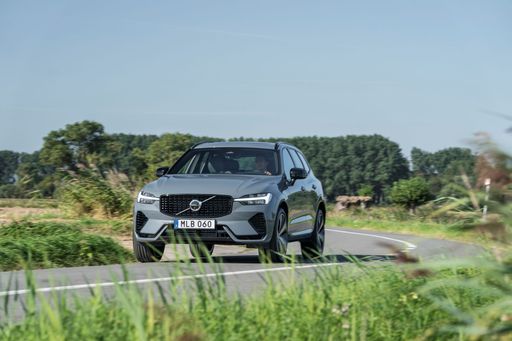
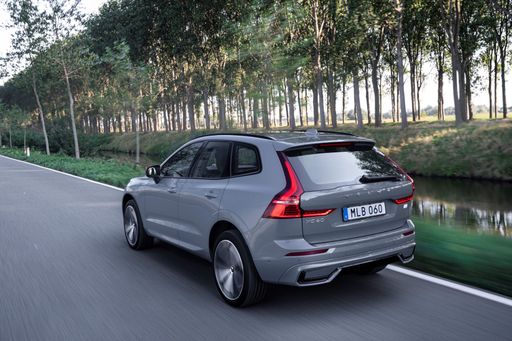
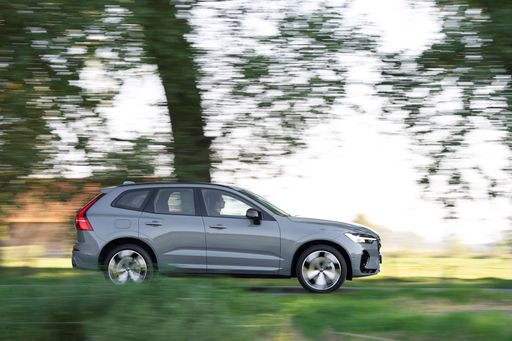
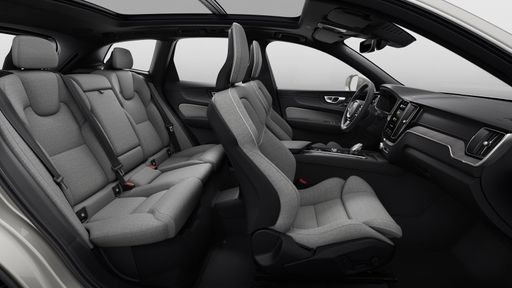
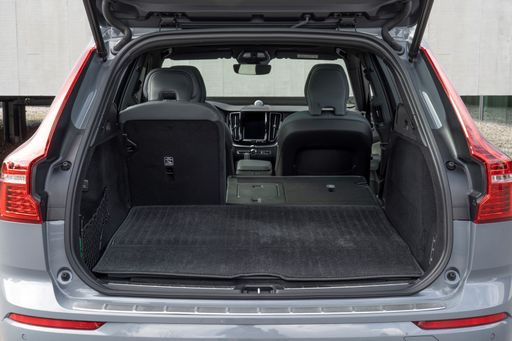
VW Tiguan
The VW Tiguan blends sensible family practicality with a dash of German polish, delivering a calm, reassuring ride and a cabin that never feels like an afterthought. For buyers who want an SUV that’s easy to live with yet still nicely dressed, the Tiguan is the grown‑up choice that keeps a cheeky wink in reserve.
details





Costs and Consumption |
|
|---|---|
|
Price
49200 - 75100 £
|
Price
33300 - 51900 £
|
|
Consumption L/100km
2.8 - 7.5 L
|
Consumption L/100km
1.4 - 8.4 L
|
|
Consumption kWh/100km
-
|
Consumption kWh/100km
-
|
|
Electric Range
74 - 82 km
|
Electric Range
118 - 126 km
|
|
Battery Capacity
14.70 kWh
|
Battery Capacity
19.70 kWh
|
|
co2
64 - 169 g/km
|
co2
32 - 190 g/km
|
|
Fuel tank capacity
71 L
|
Fuel tank capacity
45 - 58 L
|
Dimensions and Body |
|
|---|---|
|
Body Type
SUV
|
Body Type
SUV
|
|
Seats
5
|
Seats
5
|
|
Doors
5
|
Doors
5
|
|
Curb weight
1900 - 2150 kg
|
Curb weight
1599 - 1890 kg
|
|
Trunk capacity
468 - 483 L
|
Trunk capacity
490 - 652 L
|
|
Length
4708 mm
|
Length
4539 mm
|
|
Width
1902 mm
|
Width
1842 - 1859 mm
|
|
Height
1651 - 1655 mm
|
Height
1656 - 1658 mm
|
|
Max trunk capacity
1528 - 1543 L
|
Max trunk capacity
1486 - 1650 L
|
|
Payload
510 - 550 kg
|
Payload
460 - 533 kg
|
Engine and Performance |
|
|---|---|
|
Engine Type
Petrol MHEV, Plugin Hybrid
|
Engine Type
Petrol, Petrol MHEV, Diesel, Plugin Hybrid
|
|
Transmission
Automatic
|
Transmission
Automatic
|
|
Transmission Detail
Automatic Gearbox
|
Transmission Detail
Dual-Clutch Automatic
|
|
Drive Type
All-Wheel Drive
|
Drive Type
All-Wheel Drive, Front-Wheel Drive
|
|
Power HP
250 - 455 HP
|
Power HP
130 - 272 HP
|
|
Acceleration 0-100km/h
4.9 - 6.9 s
|
Acceleration 0-100km/h
5.9 - 10.6 s
|
|
Max Speed
180 km/h
|
Max Speed
210 - 242 km/h
|
|
Torque
350 - 709 Nm
|
Torque
220 - 400 Nm
|
|
Number of Cylinders
4
|
Number of Cylinders
4
|
|
Power kW
184 - 335 kW
|
Power kW
96 - 200 kW
|
|
Engine capacity
1969 cm3
|
Engine capacity
1498 - 1984 cm3
|
General |
|
|---|---|
|
Model Year
2025
|
Model Year
2024 - 2025
|
|
CO2 Efficiency Class
F, B
|
CO2 Efficiency Class
G, D, E, F, B
|
|
Brand
Volvo
|
Brand
VW
|
What drive types are available for the Volvo XC60?
The Volvo XC60 is offered with All-Wheel Drive.




